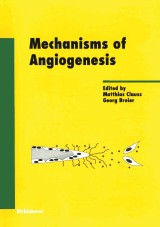Details

Mechanisms of Angiogenesis
Experientia Supplementum, Band 94
|
149,79 € |
|
| Verlag: | Birkhäuser |
| Format: | |
| Veröffentl.: | 17.01.2006 |
| ISBN/EAN: | 9783764373115 |
| Sprache: | englisch |
| Anzahl Seiten: | 321 |
Dieses eBook enthält ein Wasserzeichen.
Beschreibungen
Is it advisable to go back from bedside to the bench? During the last decade, few topics encountered such a broad interest in bio- gy and medicine as angiogenesis. The amazing ability of the body to restore blood flow by induction of blood vessel growth as part of an adaptive process has alarmed physicians dealing with diseases in which angiogenesis is either exaggerated (as in tumors) or too slow (as in ischemic diseases of heart and brain). Not surprisingly, pro- and antiangiogenic strategies have found their way into clinical trials. For instance, for the USA, the NIH website in early 2004 displayed 38 clinical studies involving either pro- or antiangiogenic th- apies. Given the expected overwhelming wealth of clinical data, the question may be asked whether further exploration of biological mechanisms is required or whether results from the bedside are instructive enough to proceed. This question depends also on the progress of pro- and antiangiogenic clinical trials. In the following, I give a short overview about some of the progress that has been made in this field. Since Judah Folkman proposed antiangiogenic tumor therapy thirty years ago, it has become increasingly evident that agents which interfere with blood vessel formation also block tumor progression. Accordingly, antiangiogenic therapy has gained much attention as a potential adjunct to conventional c- cer therapy.
Basic principles in physiological and pathophysiological angiogenesis.- How do endothelial cells orientate?.- New insights into intussusceptive angiogenesis.- Angiogenesis in the female reproductive system.- Arterialization, coronariogenesis and arteriogenesis.- Sprouting angiogenesis versus co-option in tumor angiogenesis.- Hormones and the neovascularization process: role of angiotensin II.- Can tumor angiogenesis be inhibited without resistance?.- Cellular and physical mechanisms of blood vessel growth.- Role of pericytes in vascular morphogenesis.- Role of monocytes and macrophages in angiogenesis.- Bone marrow-derived endothelial progenitor cells for neovascular formation.- Can angiogenesis be exercised?.- Angiogenesis — a self-adapting principle in hypoxia.- Cellular mechanisms of arteriogenesis.- Balancing luminal size and smooth muscle proliferation — a key control point in atherosclerosis and arteriogenesis.- Molecular mechanisms of angiogenesis.- The role of VEGF in the regulation of physiological and pathological angiogenesis.- The anti-inflammatory actions of angiopoietin-1.- The hemostatic system in angiogenesis.- Signal transduction in angiogenesis.
A concise compilation of current knowledge on angiogenesis Presents new targets for medical intervention Provides insight into molecular mechanisms of blood vessel growth
The induction of blood vessel growth as part of an adaptive process can be either exaggerated, such as in tumors, or too slow, as in ischemic diseases of heart and brain. Therefore it is an interesting target for medical intervention. <BR>This volume presents a thorough reconsideration of our current knowledge of factors and principles involved in angiogenic processes. <BR>It proceeds from a "macroscopic " perspective through cellular and physical mechanisms to the molecular level . In the first part, angiogenesis in physiological as well as pathological processes is described with a focus on embryogenesis, the reproductive system and the growing heart. <BR>The second part deals with cellular and physical mechanisms leading to angiogenesis, and the last part presents a deeper insight into molecular mechanisms of blood vessel growth, including knockout studies of essential angiogenic molecules, the identification of signaling steps in angiogenesis and the importance of cellular junctions.
-
-
© 2024 media control GmbH
Alle Preise enthalten die gesetzliche Mehrwertsteuer. - AGB
- Impressum
- Datenschutzerklärung
- Kontakt
- FAQ
- Mein Konto
- Home
- Erweiterte Suche
- Widerrufsrecht
- Reader-Software
- Desktop-Ansicht
- Gutschein-Code einlösen


